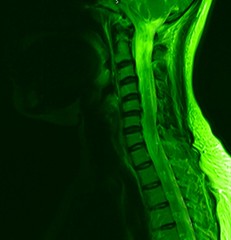I attended the opening reception of an art gallery exhibition on plastic and reconstructive surgery called I Am Art.
There were two ethos of surgery on display, the first involved rectifying gross disfigurement and injury, and the second was about perfectibility. I think, after the fact, that the curators and gallery had tried very hard to get rid of that distinction and it was we, the viewers, who insisted on dividing up the room and clumping the procedures. Two videos ran in loop- one of an infant getting cleft palette surgery and the other of a particularly nauseating rhinoplasty, more so (for me at least) because of the shaky cam than the pulling back of the skin. Both of them were difficult watching and showed off the craft of surgery well, but one was heart rendingly sympathetic and the other was a nose job. Cosmetic was interwoven with and displayed similarly to reconstructive, but we all picked out the ones we thought were of choice, which patients were brave, which patients were vain. We based those inevitable assessments on nothing more than the blanket presentation of imagery. They lacked stories or personal statements about how these people came to be art under the knives of their surgeons. In that way, it was a mere mug shot gallery of physical change.
A woman who befriended me near the tummy tuck and boob job display said of the tucking and boobing surgeon, “He likes to cut up women.” There was a cut up quality to his choices of pictures- all headless and legless torsos, each with a scar that looked like the curve of a valley on a far horizon stretching between their hips, where the pouches they had carried their children in had been cut away. When he made his women into art, he made it so they had no heads to think or express, or legs to run. But he clearly made his women as Perfected as he could, as his canvas would allow. He made saggy breasts cartoonish in their constructed opposition to gravity, and pulled the skin back from their belly buttons aggressively. It reminded me of Hello Kitty, iconically and algorithmically pleasing, and mouthless.
In one case, a double radical mastectomy, He had constructed whole new breasts from the pregnancy pouch. I stared at those images for a while, wondering at this strange incarnation and adaptation of motherhood. I wished I could have seen her face. I wanted to know how her synthetic breasts did. Did they make riding on the subway easier or harder? Did anyone reject her? Did they save her marriage? Give her the courage to leave it? I had nothing but torsos to go on.
I also found myself shopping. No matter how you feel about your body, you start remaking it a bit looking at this kind of surgery photography. It’s a little like how you begin to mentally redecorate your house when reading a certain type of magazine. You just do.
There were a few gaggles of Surgically Perfected Women in attendance, something like how I pictured the daughter in David Foster Wallace’s Tri-Stan. They had an otherness to them that I realized was demographic, the same way body modders must look a bit alien to people that aren’t me. Their surgical choices were not inscrutable to me, but the obvious effort they made on make-up was. The sacrifice and pain of surgery I get, the daily drudgery and expense of heavy and meticulous make-up confounds me. I tried to get into conversations with them a couple times, but failed. Perhaps a tired looking t-shirt and sneakers wearing girl with scraggly hair, too many bags and no make-up at all was as demographically alien to them and they were to me. The women who talked to me largely criticized them, calling them Stepford and worse; the men stayed silent. For the evening, it seemed, I was put on a team in a fight I didn’t know existed and was probably ideologically opposed to. I felt as well that something New York was happening, and I was far too Californian to understand it, and therefore far too likely to suggest hugging as an answer to have anyone want to explain it to me.
I can say for sure, despite the criticisms of team imPerfect, the Surgically Perfected Woman were not spineless and compliant creatures. They strutted, proud of what they were, showing off the breasts and lips doctors had created for them with no shame. And it made sense, why work so hard on your appearance only to be ashamed? I could admire them as having taken a stand to inhabit a cultural norm with as much fury and conscious determination as the extreme modders with their facial tattoos, horns, and metal studs had taken their stand to reject it.
My new friend’s animus was more complex than this. When she was 12 her parents, people who had terribly feared losing their looks, went to the plastic surgeon and gotten faces lifts together. I had a tender image of them sitting together in that doctor’s office holding hands, keeping each other company and working up the courage, but for her it had been horrifying. They’d returned with huge swollen heads, medicated for pain and bandaged. Here she mimed them with her own hands far out to the sides of her head, bouncing back and forth like a bobble. She had been terrified, but also couldn’t look away. What they had done to themselves they had done to her. As is the way of parents, they were too far from the egocentric enmeshment of childhood to see that they were doing it to her. She had spent 17 years slowly writing a musical about the experience.
I mentioned that my mom had gotten into body piecing when I was a teenager. “That is not ok!” she announced vigorously, “It is not ok for parents to be cooler than their child!” I told her I was always fine with it, that my mother never felt like she was threatening to outcool me. The same thing, this same quality of parent’s actions washing out into the lives of child had happened to me as well, but gone the other way. I happily realized that I could get pierced or tattooed and it wouldn’t be a rebellion- I had a license no one else had, and I liked it. I didn’t use it, I wouldn’t get modified for many years, but I liked that if I did, my mother would already understand it. The same thing that had horrified and alienated her had given me choices.
The exhibit was about a complex topic, more so than I think the people that did it understood. It needed to explain the relationships and the choices, to talk about who the people were. It didn’t rise to the challenge. Looking back, I feel like this talk of our parents, all while surrounded by pictures and videos of graphic surgeries, before and after mug shots, and cliques of post surgical women added the context the exhibition so needed. We were all stepping in and out of alienation, wearing our choices on our faces.

